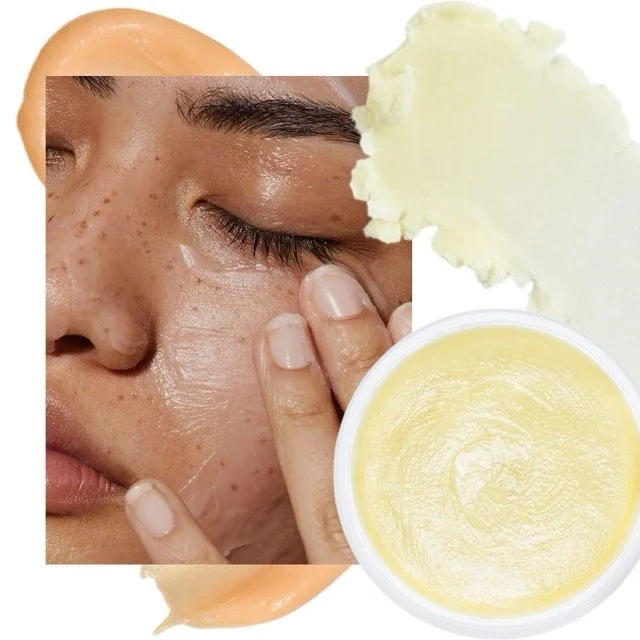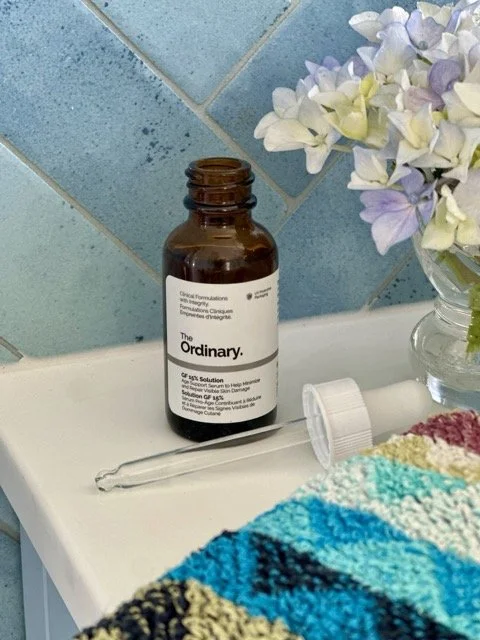For the skin, hair and lips.
Read MoreWarm hues to pull us out of the cold season
How to embrace these tones in your home.
Read MoreThe clavi-cut
The ultimate style for fine hair.
Read MoreThe best lip balms
That delivers more than moisture and meets any budget.
Read MoreBag charms
Time to bedazzle your favourite arm candy.
Read MoreIs There A Good Way To Exfoliate Skin?
We get expert advice.
Read MoreWhat are neuropeptides?
Skincare formulations are becoming more innovative and intelligent. Science has enabled chemists to use high-tech ingredients that deliver age-erasing results. The new kids on the block are neuropeptides, arguably the latest beauty buzz. Editor Trudi Brewer shares the latest research and the skincare loaded with them.
Image Pinterest
To understand the role of neuropeptides in the skin, it's best to recap on peptides and how they work. Peptides are short chains of amino acids, the building blocks of essential proteins within our skin, like collagen, elastin and keratin – and help maintain healthy skin texture, strength and resilience.
With dozens of options, peptides have a unique functionality and effect, adds Dr Tina Meder, a cosmetic chemist and founder of Meder Beauty. “There are hundreds of them, from copper peptides to glutatShort chains of amino acids peptides serve as the building blocks for essential proteins like collagen, elastin, and keratin. Hundreds of peptides, from copper to glutathione, come in varying categories: carrier peptides, enzyme inhibitors, signal, and neurotransmitter peptides. Featuring in creams, serums, and masks, they help promote firmer-looking skin and boost clarity to uneven skin texture. The interest in peptides doesn’t seem to be slowing down either, with neuropeptides (a specific class of peptides) gaining popularity, too.
So, what are neuropeptides? A heterogeneous group of peptides that studies have shown can stimulate collagen production in the skin. “Neuropeptides are also short chains of amino acids that act as chemical messengers,” explains Dr Melanie Palm, a board-certified dermatologist and cosmetic surgeon at Art of Skin MD. “When applied topically, neuropeptides have been shown to stimulate collagen, elastin, and hyaluronic acid production, and they are often marketed as a topical alternative to neurotoxins like Botox.”
Environ Focus on Filler Youth+, $151.
Seven years in the making, with 45 million reviewed hexapeptides, this is the smartest, science-based skincare product on the world stage. Why? It combines hyaluronic acid (HA) technologies, innovative peptide technology, and potent antioxidants. This formula plumps and hydrates, a non-invasive solution for skin that looks lax and has volume loss.
What Are The Different Types Of Neuropeptides?
The most effective neuropeptides used in skin care formulations are Matrixyl, Argireline, palmitoyl oligopeptide, and palmitoyl tetrapeptide-7. “Each neuropeptide has a different function, from stimulating collagen production to protecting from sun damage,” says dermatologist Dr Jeannette Graf, assistant clinical professor of dermatology at Mt. Sinai School of Medicine. “Their function depends on which specific cell receptors they recognise to have the desired effect. Some stimulate collagen and elastin production while others prevent their degradation to sustain younger-looking skin.”
The Ordinary Argireline Solution 10%, $20.
Like all of this brand's other products, this serum is of amazing value for its potent concentration of the star-lifting and firming peptide ingredient Argireline. The first step in your routine is to apply the liquid-like formula (post-cleansing), and then you can layer on other serums and creams. You can expect an instant, satisfying tightening effect and, over time, softening of fine lines.
How do neuropeptides work?
Applied topically, neuropeptides have the potential to fight signs of ageing; while they’re said to mimic the effects of Botox, they do not freeze the face or immobilise muscles. “Instead, neuropeptides can attach to receptors that can modulate the production of inflammatory cytokines, wound healing, cellular proliferation, and other processes within our skin,” explains dermatologist Dr Ava Shamban. Who adds, “More importantly, they can influence the release of neurotransmitters—specifically, those that lead to facial muscle contractions and cause wrinkles.
Medik8 Eyelift Peptides, $115.
The formula features five age-defying peptides, including Matrixyl 3000, rice and soy proteins, citrus extract, and hesperidin. These ingredients improve blood circulation and strengthen the capillary walls to help brighten the eyes. Together, they create a bright-eyed awakening effect for tired eyes.
How do Neuropeptides Work in Skin Care Products?
“The idea behind using neuropeptides in skin care is to utilise their ability to communicate with skin cells and produce more collagen, which comes from applying topically,” explains Dr Graf. “The signals sent within the skin will help promote processes like the relaxation of facial muscles, collagen production, as well as strengthening the skin barrier and improving its overall appearance.” According to Dr Palm, neuropeptides mimic signalling that affects nerves, so they may impact sensory nerves and potentially minimise the discomfort or side effects felt after specific procedures. “For example, neuropeptides found in newer post-procedure creams have been shown to remarkably decrease discomfort, redness, and swelling, following in-office procedures such as micro-needling or energy-based devices or laser devices,” she explains.
Prevage 3-in-1 Reset Serum, $199.
This new peptide-fuelled serum is stacked with acetyl hexapeptide-8, palmitoyl tetrapeptide-1 and 7, the moisture magnet hyaluronic acid, a raft of skin-smoothing plant extracts, and the hero idebenone. This powerful antioxidant is four times more potent than vitamin C, a brilliant wrinkle reducer that protects the skin against free radical damage. The combination of hard-hitting peptides and idebenone has put Prevage on the beauty map as a serious anti-ageing solution.
Can Neuropeptides Offer The Same Effect As Botox?
The short answer is no. These peptides are not a replacement for injectable neurotoxins. They don’t offer the same dramatic and long-lasting effects.“Certain neuropeptides, such as Argirilene, have been used in skincare. In addition to helping collagen production, they have been able to relax facial muscles, decreasing lines and wrinkles caused by movement,” explains Dr Graf. “While these neuropeptides can reduce signs of ageing by relaxing facial muscles emulating the effects of ‘Botox,’ they are not nearly as effective as injectable neurotoxins.” Dr Palm says a topically applied neuropeptide is only most likely to impact the outer layers of the skin. “This means neuropeptides will likely be ineffective in treating wrinkles in areas of the face that experience a lot of movement, like around the mouth, eyes, and forehead.” Experts agree one way to capitalise on neuropeptides' effects is to use them in conjunction with injectable neurotoxins.
The Best Fashion Moments So Far At The 2024 Summer Paris Olympics
From Swarovski-encrusted leotards to insane nail art.
Read MoreRosè wine
Just so you know it’s also a winter staple.
Read MoreRabanne Olympéa Parfum
A new amber-green floral.
Read More



















Update your beauty routine with these newbies.